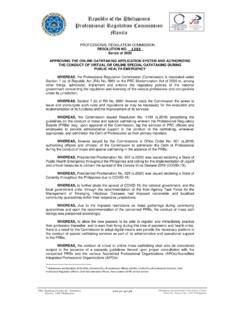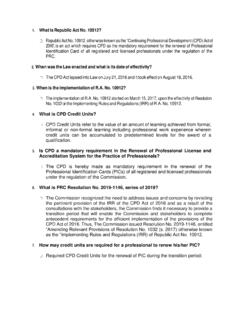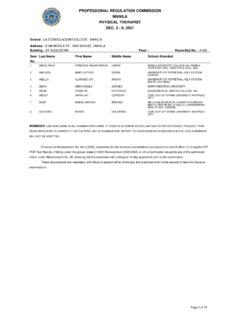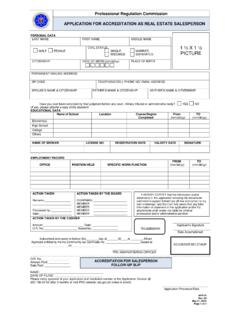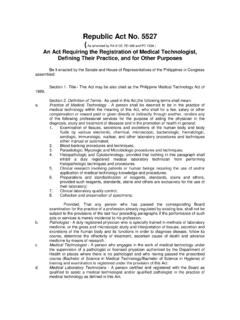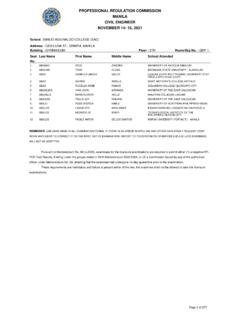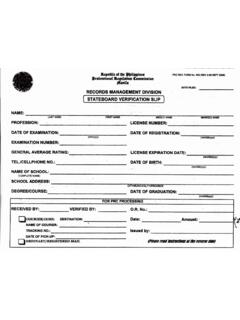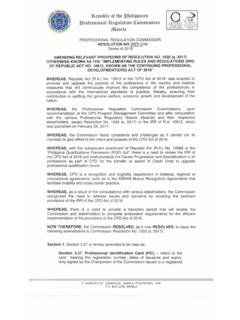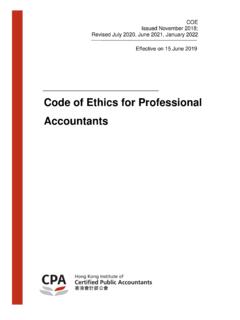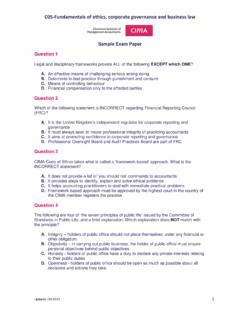Transcription of CODE OF ETHICS FOR PROFESSIONAL ACCOUNTANTS IN …
1 1 January, 2004 CODE OF ETHICS FOR PROFESSIONAL ACCOUNTANTS IN THE PHILIPPINES CONTENTS _____ Paragraph PREFACE DEFINITIONS 1 THE PUBLIC 9 14 FUNDAMENTAL 15 THE 17 PART A-APPLICABLE TO ALL PROFESSIONAL ACCOUNTANTS 1. Integrity and 2. Resolution of Ethical 3. PROFESSIONAL 4. 5. Tax 6. Cross Border 7. PART B-APPLICABLE TO PROFESSIONAL ACCOUNTANTS IN PUBLIC PRACTICE 8. Independence for Assurance 9. PROFESSIONAL Competence and Responsibilities Regarding the Use of 10. Fees and 11. Activities Incompatible with the Practice of Public 12. Client s 13.
2 Relations with Other PROFESSIONAL ACCOUNTANTS in Public 14. Advertising and PART C-APPLICABLE TO EMPLOYED PROFESSIONAL ACCOUNTANTS 15. Conflict of 16. Support for PROFESSIONAL 17. PROFESSIONAL 18. Presentation of 2 PREFACE TO THE CODE OF ETHICS FOR PROFESSIONAL ACCOUNTANTS IN THE PHILIPPINES This Preface and the following Code of ETHICS for Certified Public ACCOUNTANTS (CPAs) in the Philippines, have been approved by the Board of Directors of the Philippine Institute of Certified Public ACCOUNTANTS (PICPA) to be recommended for adoption by the Board of Accountancy (BOA) and approval of the PROFESSIONAL Regulation Commission (PRC) as part of the rules and regulations of the BOA for the practice of the accountancy profession.
3 1. PICPA as a member of the International Federation of ACCOUNTANTS (IFAC) is committed to the IFAC s broad objective of developing and enhancing a coordinated worldwide accountancy profession with harmonized standards. In working toward this objective, IFAC develops guidance on ETHICS for PROFESSIONAL ACCOUNTANTS . IFAC believes that issuing such guidance will improve the degree of uniformity of PROFESSIONAL ETHICS throughout the world. 2. As a condition of its membership, PICPA is obliged to support the work of IFAC by informing its members of every pronouncement developed by IFAC, and to work towards implementation, when and to the extent possible under local circumstances, of those pronouncements .
4 3. This Code of ETHICS for PROFESSIONAL ACCOUNTANTS (Code) in the Philippines is based on the International Code of ETHICS for PROFESSIONAL ACCOUNTANTS developed by IFAC. PROFESSIONAL ACCOUNTANTS refer to persons who are Certified Public ACCOUNTANTS (CPA) and who hold a valid certificate issued by the Board of Accountancy whether they be in public practice (including a sole proprietorship or partnership), industry, commerce, the public sector or education. Where a national statutory requirement is in conflict with a provision of the IFAC Code, the national statutory requirement prevails. In the few instances where the national statutory requirement prevailed over a provision of the IFAC Code, the basic intent of the IFAC Code was always respected.
5 (See modifications made to the IFAC Code) 4. This Code of ETHICS is mandatory for all CPAs and is applicable to PROFESSIONAL services performed in the Philippines on or after January 1, 2004. 5. An explanatory foreword will be issued on the status of each additional IFAC pronouncement on ETHICS . The explanatory foreword will indicate which additional pronouncement on ETHICS is adopted in the Philippines; and if not adopted, the reason therefor shall be stated. Where deemed necessary, additional ethical requirements may be developed on matters of relevance not covered by an IFAC pronouncement. 36.
6 All CPAs are expected to comply with the ethical requirements of this Code and other ethical requirements that may be adopted and approved by IFAC. Apparent failure to do so may result in an investigation into the CPA s conduct. 7. It is not practical to establish ethical requirements which apply to all situations and circumstances that PROFESSIONAL ACCOUNTANTS may encounter. Therefore, PROFESSIONAL ACCOUNTANTS should consider the ethical requirements as the basic principles which they should follow in performing their work. Modifications to the IFAC Code 8. The following changes have been made to the IFAC Code to consider Philippine regulatory requirements and circumstances.
7 Introduction, paragraph 16 The section on Technical Standards was modified to list the sources of technical and PROFESSIONAL standards in the Philippines as follows: Board of Accountancy(BOA)/ PROFESSIONAL Regulation Commission (PRC); Securities and Exchange Commission (SEC); Auditing Standards and Practices Council (ASPC); Accounting Standards Council (ASC); Relevant legislation. Definitions Firm; Practice: The word corporation was deleted from the Definitions because a corporate form for the PROFESSIONAL practice of accountancy is not allowed in the Philippines. PROFESSIONAL ACCOUNTANTS : The phrase who are Certified Public ACCOUNTANTS (CPAs) and who hold valid certificate issued by the Board of Accountancy was added.
8 PROFESSIONAL ACCOUNTANTS in public practice: The phrase a sole proprietor was added. Long Association of Senior Personnel with Assurance Clients, Paragraph The period for rotation of the lead engagement partner was changed from seven to five years. 4 Commission, Paragraph This paragraph was deleted since payment and receipt of commissions are not permitted in the Philippines. Advertising and Solicitation Paragraph was modified to read as follows: Advertising and solicitation by individual PROFESSIONAL ACCOUNTANTS in public practice are not permitted in the Philippines.
9 Paragraphs and were deleted since advertising and solicitation are not permitted in the Philippines. Paragraph Additional examples relating to anniversaries and websites wherein publicity is acceptable, as provided in BOA Resolution 19, Series of 2000, were included. 5 DEFINITIONS In this Code of ETHICS for PROFESSIONAL ACCOUNTANTS the following expressions appear in bold type when they are first used and have the following meanings assigned to them: Advertising The communication to the public of information as to the services or skills provided by PROFESSIONAL ACCOUNTANTS in public practice with a view to procuring PROFESSIONAL business.
10 Audit client An entity in respect of which a firm conducts an audit engagement. When the audit client is a listed entity, audit client will always include its related entities. Audit engagement An assurance engagement to provide a high level of assurance that financial statements are free of material misstatement, such as an engagement in accordance with Philippine Standards on Auditing. This includes a Statutory Audit which is an audit required by national legislation or other regulation. Assurance client An entity in respect of which a firm conducts an assurance engagement. Assurance engagement An engagement conducted to provide: (a) a high level of assurance that the subject matter conforms in all material respects with identified suitable criteria; or (b) a moderate level of assurance that the subject matter is plausible in the circumstances.
